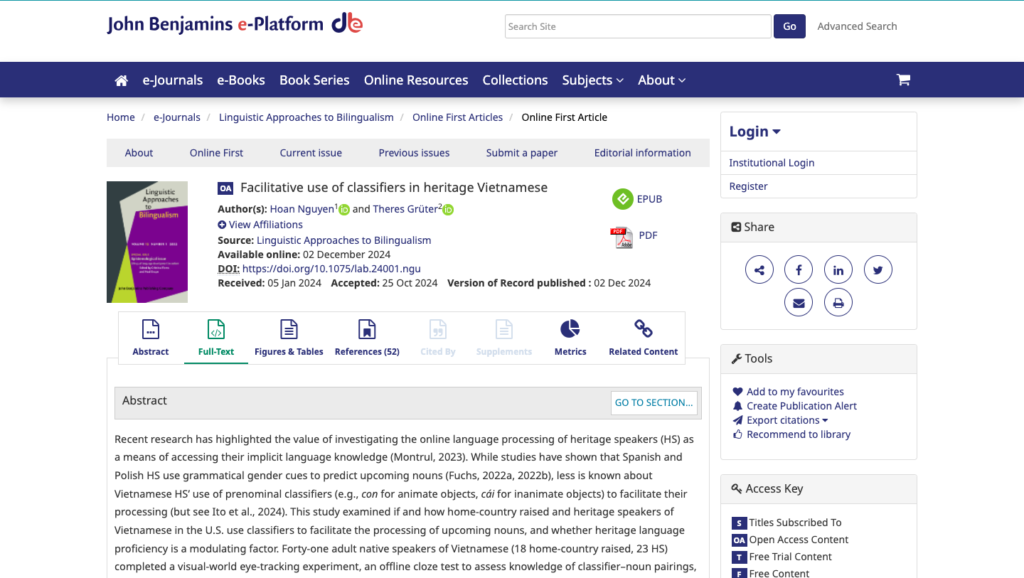
I am excited to announce the recent publication of our research on the online language processing of Vietnamese heritage speakers (HS). This collaborative effort with my esteemed MA supervisor delves into the intriguing world of how heritage language speakers utilize linguistic cues to comprehend their native language.
The Power of Prenominal Classifiers
Our study focused on a specific linguistic feature: prenominal classifiers. These are words that precede nouns and provide semantic information about the noun’s properties, such as animacy or shape. In Vietnamese, classifiers are a crucial part of the language system, and we were curious to explore how heritage speakers leverage them to enhance their language processing.
Key Findings
Through a rigorous eye-tracking experiment, we discovered several key insights:
- Heritage Speakers as Skilled Language Processors: Despite potential variability in their language proficiency, heritage speakers demonstrated a remarkable ability to utilize prenominal classifiers to predict upcoming nouns.
- The Role of Proficiency: While heritage language proficiency did not significantly influence the extent to which participants engaged in predictive processing, it did impact the speed and accuracy of lexical access.
- The Impact of Home-Country Exposure: Home-country raised participants, who had more extensive exposure to the language, exhibited a stronger reliance on classifiers compared to heritage speakers.
Access the Full Study
To delve deeper into our findings, data, and analyses, we invite you to explore our open-access publication here [https://www.jbe-platform.com/content/journals/10.1075/lab.24001.ngu] and on OSF: https://osf.io/czb8p
The Broader Implications
Our research contributes to a growing body of work on heritage language processing, shedding light on the cognitive mechanisms underlying language comprehension in bilingual and multilingual individuals. By understanding how heritage speakers process their language, we can gain valuable insights into the nature of language acquisition, bilingualism, and cognitive aging.
We hope that our findings will inspire further research on the linguistic abilities of heritage speakers and inform language education and assessment practices.
Acknowledgments
We would like to express our sincere gratitude to all our participants. We thank Daniel R. Isbell, Huy Phung, Jieun Kim, Hitoshi Nishizawa for providing valuable guidance on data analysis. We are very grateful to the audiences at the 36th Annual Conference on Human Sentence Processing and the 14th Heritage Language Research Institute, and to the reviewers and editors of this journal for helpful feedback and suggestions, which have made this manuscript better. This research was supported by a Carr Holmes Scholarship from the Department of Second Language Studies at UH Mānoa.
Keywords: heritage language, Vietnamese, prenominal classifiers, eye-tracking, language processing, bilingualism
Please feel free to share this blog post with your colleagues, students, and anyone interested in language science and heritage language studies.
